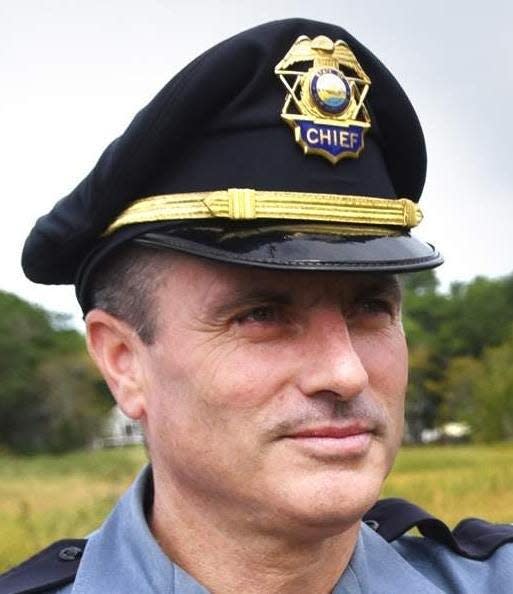Rye police chief: It's not OK for teens to drink and parents must stop covering for them
RYE — Underage drinking has long been a safety issue Police Chief Kevin Walsh has worked to address. This week, he said officers are getting unexpected resistance from parents as they try to prevent potentially fatal incidents involving teenagers.
In an open letter to parents of high school age children posted in social media, Walsh talked about the latest incident of underage drinking police responded to last weekend. He cited a lack of cooperation from parents, who, in some cases, refused to identify themselves and their child.
"With your help, we can send the message that it is not 'OK' to provide alcohol or condone the consumption of alcohol by those under the age of 21," Walsh said.

"This past weekend, Rye police was dispatched to a home in Rye," Walsh wrote in his letter. "Officers discovered juveniles under the age of 18 in the presence of alcohol. Some of the juveniles had consumed alcohol. Police officers are obligated to protect the public, and reasonable prudence dictates teenagers (juveniles) in possession of, or who have consumed alcohol illegally be detained because of the foreseeably present danger to the public and to themselves. Due care mandates that they be identified, and their parents notified."
More local news:Emergency room wait times a nightmare on Seacoast, nationally. Here are causes and solutions.
New Hampshire law regarding police and underage drinking
New Hampshire police have been required to take teens into custody, and release them to a parent or guardian since a July 17, 1986 court ruling in the case of Weldy v. The Town of Kingston. The incident the suit was based on took place Sept. 11, 1982. Five teens, three boys and two girls, ages 13-19, were stopped for speeding by Kingston police and found to have been drinking beer they bought at a store in Raymond. Police issued a summons for transporting alcohol, confiscated the alcohol and released the teens, who went to a store in Haverhill, Massachusetts, bought more beer (both times without being asked for identification), went to a drive-in movie, and continued drinking.
As the teens were returning to Kingston later that night, they saw headlights in their rear mirror. Thinking it was police, they sped off, failed to negotiate a turn and struck a cement marker, overturning the car. One teen, Nancy Weldy, died and two others were injured.
"This case is taught at the New Hampshire Police Academy and at every field training," said Walsh, who has 35 years of law enforcement experience, including 16 as chief in Rye. "A lot of policy is based on this case. We are required to act whenever there is alcohol and underage drinkers. Some of the teens in this case blew a zero, hadn't drank, but it still is the responsibility of everyone who was involved."
— Rye Police NH (@RyePoliceNH) February 16, 2023
Parents allowing drinking parties, providing alcohol a problem, chief says
Walsh said underage alcohol parties have long plagued the beach community and some parents sanction it, believing teens are safer drinking at home. It is still illegal, he said.
"Besides it being what we must do, it is my belief that it saves lives," he said. "Kids are not getting in a car and driving if we take them into custody. How upset are kids when a friend they know dies in a drunk-driving accident? Let's work together to prevent this."
More local news:Hampton man charged with firing dozens of gunshots near daycare. Bail denied.
Walsh described the behavior of parents last weekend who did not cooperate with police at the underage drinking gathering.
"One mother said she would come back with her identification and never returned," Walsh said. "Officers need to ensure they are releasing the juvenile to the correct parent. Parents must show identification at daycare to pick up their child every day, so I am having trouble understanding why this situation is any different."
Walsh said he has trouble understanding why parents are being resistant, when his officers are working to prevent a tragic outcome.
"Maybe it's a new generation, a new curve in parenting," he said. "I have done much research on this and I believe a dialogue needs to happen between kids and parents, and it needs to happen early. Preventing teen drinking, drug use has to start at home."
Walsh said he encourages everyone to change how they think, talk, and act when it comes to underage drinking.
"We need to stop accepting it and to start discouraging it," he said. "It's time to help young people understand that it is not OK for them to drink alcohol. The discussion needs to start long before youth start thinking about drinking."
Walsh said he has met with other area police chiefs, and they are planning a program to bring into the high schools, to get a conversation started.
"Everyone has a role in creating a community where young people can grow up and feel good about themselves without drinking alcohol," Walsh wrote in his letter. "Everyone in the community should deliver the message that underage drinking is not okay. The message should be the same whether youth hear it in school, at home, in places of worship, on the sports field, in youth programs, or in other places where young people gather. Families can help prevent underage drinking by staying involved in their children's lives. It is important for families to pay attention to what is happening with their teens. Young people can learn about the dangers of alcohol use. They can change how they and others think about drinking."
This article originally appeared on Portsmouth Herald: Rye police chief: Parents are big part of teen drinking problem
